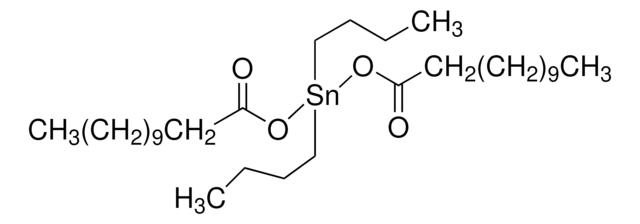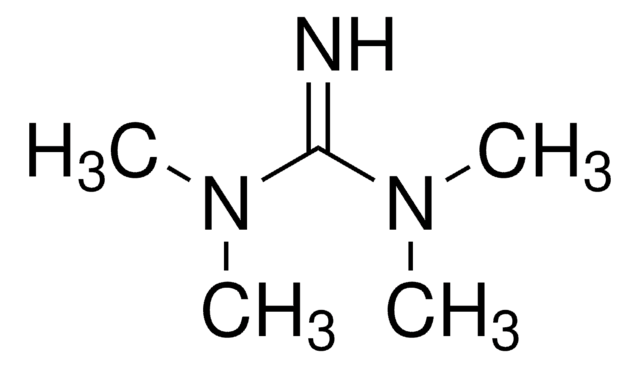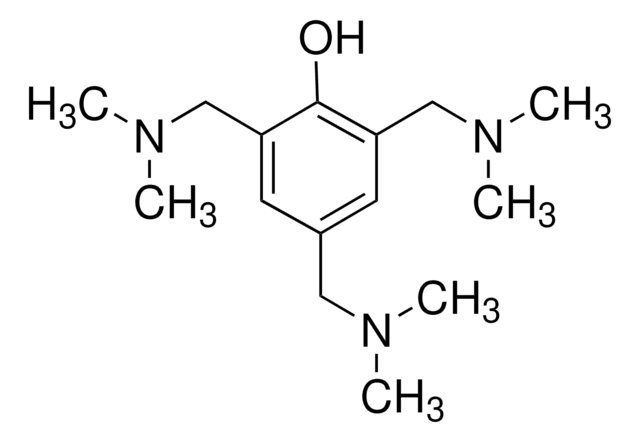424528
4,4′-(Oxydi-2,1-ethandiyl)bis-morpholin
97%
Synonym(e):
β,β′-Dimorpholinodiethyl ether, 2,2′-Dimorpholinodiethyl ether, 4,4′-(Oxydiethylene)dimorpholine, Bis(morpholinoethyl) ether
About This Item
Empfohlene Produkte
Assay
97%
Brechungsindex
n20/D 1.484 (lit.)
bp
309 °C (lit.)
Dichte
1.06 g/mL at 25 °C (lit.)
SMILES String
C(CN1CCOCC1)OCCN2CCOCC2
InChI
1S/C12H24N2O3/c1-7-15-8-2-13(1)5-11-17-12-6-14-3-9-16-10-4-14/h1-12H2
InChIKey
ZMSQJSMSLXVTKN-UHFFFAOYSA-N
Allgemeine Beschreibung
Anwendung
Signalwort
Warning
H-Sätze
P-Sätze
Gefahreneinstufungen
Eye Irrit. 2
Lagerklassenschlüssel
10 - Combustible liquids
WGK
WGK 1
Flammpunkt (°F)
Not applicable
Flammpunkt (°C)
Not applicable
Persönliche Schutzausrüstung
Eyeshields, Gloves, type ABEK (EN14387) respirator filter
Analysenzertifikate (COA)
Suchen Sie nach Analysenzertifikate (COA), indem Sie die Lot-/Chargennummer des Produkts eingeben. Lot- und Chargennummern sind auf dem Produktetikett hinter den Wörtern ‘Lot’ oder ‘Batch’ (Lot oder Charge) zu finden.
Besitzen Sie dieses Produkt bereits?
In der Dokumentenbibliothek finden Sie die Dokumentation zu den Produkten, die Sie kürzlich erworben haben.
Kunden haben sich ebenfalls angesehen
Unser Team von Wissenschaftlern verfügt über Erfahrung in allen Forschungsbereichen einschließlich Life Science, Materialwissenschaften, chemischer Synthese, Chromatographie, Analytik und vielen mehr..
Setzen Sie sich mit dem technischen Dienst in Verbindung.![Bis[2-(N,N-dimethylamino)ethyl] ether 97%](/deepweb/assets/sigmaaldrich/product/structures/372/323/505a46ae-b067-4177-8e5f-19a3f4ef9c44/640/505a46ae-b067-4177-8e5f-19a3f4ef9c44.png)


![1,8-Diazabicyclo[5.4.0]undec-7-en (1,5-5) 98%](/deepweb/assets/sigmaaldrich/product/structures/120/564/5b373e23-1624-489c-8efb-692de0f96ffb/640/5b373e23-1624-489c-8efb-692de0f96ffb.png)
![1,4-Diazabicyclo[2.2.2]octan ReagentPlus®, ≥99%](/deepweb/assets/sigmaaldrich/product/structures/366/129/a6ff4175-974d-4fac-9038-b35e508ef252/640/a6ff4175-974d-4fac-9038-b35e508ef252.png)


![1,5,7-Triazabicyclo[4.4.0]dec-5-en 98%](/deepweb/assets/sigmaaldrich/product/structures/171/446/333d560c-cff6-4958-b489-5acfb3057cce/640/333d560c-cff6-4958-b489-5acfb3057cce.png)
![1-[Bis[3-(dimethylamino)propyl]amino]-2-propanol 98%](/deepweb/assets/sigmaaldrich/product/structures/228/232/cb6938f1-8d46-4514-b5dc-8048ce8f3bf0/640/cb6938f1-8d46-4514-b5dc-8048ce8f3bf0.png)

